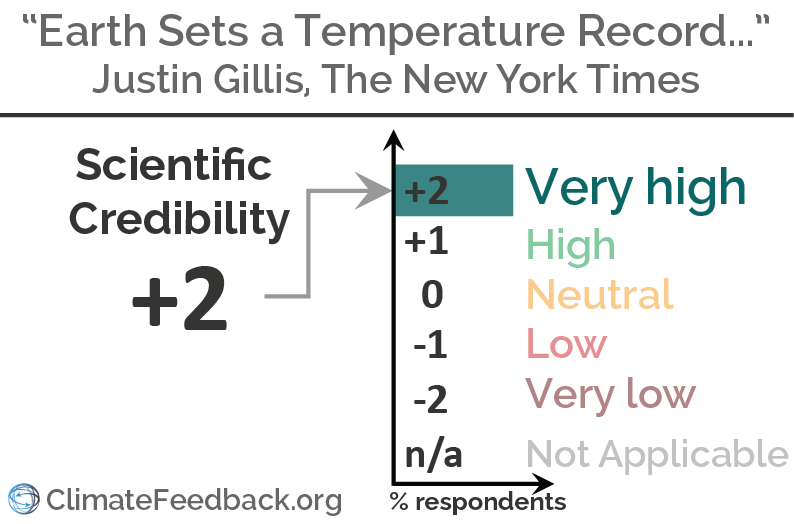- Climate
New York Times’ news coverage of 2016 global temperature data was an accurate summary
Reviewed content

Headline: "Earth Sets a Temperature Record for the Third Straight Year"
Published in The New York Times, by Justin Gillis, on 2017-01-18.

Scientists’ Feedback
SUMMARY
In January 2017, NASA and NOAA released their data for average global temperature in 2016, which ranked as the warmest year on record. This story in the New York Times described the new record and provided some context for rising temperatures.
The scientists who reviewed this article found that it accurately described the data and clearly explained their relationship to climate change.
See all the scientists’ annotations in context
This is part of a series of reviews of 2017’s most popular climate stories on social media.
REVIEWERS’ OVERALL FEEDBACK
These comments are the overall opinion of scientists on the article, they are substantiated by their knowledge in the field and by the content of the analysis in the annotations on the article.

Scientist, University of Bonn, Germany
A clear and accurate article on the temperature record in 2016, looking back at the records in 2015 and 2014. The article places them in the proper context of long-term warming, while mentioning the special effects that helped make the year a record.

Research Scientist, Lawrence Livermore National Laboratory
The article was a good summary of the record warmth in 2016. The summary also made a number of useful points that put 2016 into the context of the science of global climate change and the politics of global warming. In particular, the authors highlighted ocean heat accumulation, that global warming is not linear, and also acknowledged that the US has many leaders that are climate skeptics despite continued, record warmth.

Assistant Professor, San Jose State University
Extremely high scientific accuracy for an article intended for a general readership. Appropriate caveats are included without confusing the general story.
Notes:
[1] See the rating guidelines used for article evaluations.
[2] Each evaluation is independent. Scientists’ comments are all published at the same time.
Featured Annotations
The statements quoted below are from the article; comments and replies are from the reviewers.
“The findings about a record-warm year were also confirmed by the Berkeley Earth surface temperature project, a nonprofit California group set up to provide a temperature analysis independent of governments.That group, however, did not find that three records had been set in a row; in its analysis, 2010 was slightly warmer than 2014.”

Research Scientist, Lawrence Livermore National Laboratory
This is a small, but useful illustration that there is uncertainty in these datasets and their representation of record warmth.
“When the heat buildup in the ocean is taken into account, global temperatures are rising relentlessly.”

Research Scientist, Lawrence Livermore National Laboratory
This is an excellent and important point.
“The arc of global warming will be variously steep and less steep,’ said Richard Seager, a climate scientist at the Lamont-Doherty Earth Observatory of Columbia University. ‘It never stopped.’”

Research Scientist, Lawrence Livermore National Laboratory
This is another important point to make—there will be periods where the Earth warms less quickly (not every year will be a record year) but the heating of the Earth continues.
“The heat extremes were especially pervasive in the Arctic, with temperatures in the fall running 20 to 30 degrees Fahrenheit above normal across large stretches of the Arctic Ocean.”

Scientist, University of Bonn, Germany
Where the Arctic ocean freezes the air can get very cold because the ice blocks the heat transport from the relatively warm ocean water. The temperature variability is naturally larger in the Arctic than in the mid-latitudes (USA, Europe).
Thus it was very warm in the Arctic. As NASA’s Gavin Schmidt said: “What’s going on in the Arctic is really very impressive; this year was ridiculously off the chart”
But 20 to 30 degrees Fahrenheit may not be as exceptional as it sounds to our ears.

Research Scientist, Lawrence Livermore National Laboratory
I agree that sea ice plays an important role, but that doesn’t necessarily mean that the temperature changes are not exceptional. I also agree that on small spatial scales large temperature deviations are not necessarily surprising, but what happened across the Arctic in 2016 was unprecedented according to NOAA.
“Since 1880, NOAA’s records show only one other instance when global temperature records were set three years in a row: in 1939, 1940 and 1941.”

Scientist, University of Bonn, Germany
The start of the second world war also changed the composition of the fleet making the sea surface temperature observations and with it the measurement methods used changed quickly. Climatologists have made adjustments to account for this problem, but it is well possible that this was incomplete. Uncertainties in this period are larger than in the decades before and after.
Thus it could well be that these three records in a row are due to remaining problems. I would not have emphasised it.



